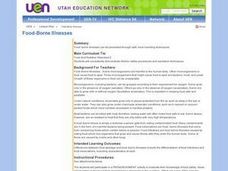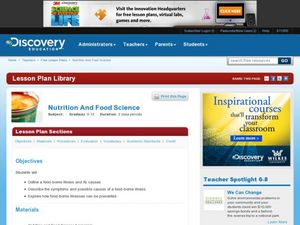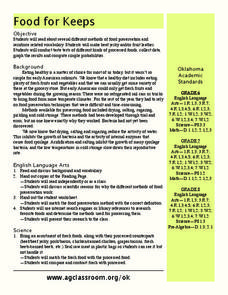Learning Games Lab
Testing and Adjusting pH
Pupils learn how to control food spoilage by adjusting the food's pH. They see that one of the most dangerous bacteria can grow in food if people don't handle and store food properly. Using knowledge of the bacteria's preferred pH,...
Learning Games Lab
Controlling Water Activity in Food
Food storage matters! Scholars learn how the amount of water in corn can affect its rate of spoilage. They create a control group, then test three corn samples stored in three different locations for water activity. As a result of the...
Curated OER
Food-Borne Illnesses
Use this lesson to have your charges consider the differences between food spoilage and food-borne illnesses including the differentiation of food infections and food intoxication, including characteristics of each. Some excellent...
Curated OER
Chapter 16, Food Biotechnology
Although the points given on these slides are valid, the visual accessibility is poor. Consequently, many viewers would be distracted or entirely unable to view the presentation. The content is a review of microorganisms and their...
Learning Games Lab
Understanding Water Activity
How does water activity play a role in food spoilage? First, the learners think about which types of foods would be best to take on a backpacking trip based on the water activity of different foods. It then walks through why water...
Curated OER
Nutrition and Food Science
Students examine the causes and symptoms of food-borne illnesses and ways to prevent them. In this nutrition lesson students work in teams to investigate a type of food-borne illness and present a scenario about it.
Curated OER
Food For Keeps
Students explore food. In this processed and fresh foods lesson, students discover how some foods are processed and how they differ from fresh food. The complete group activities and an individual reading assignment. This lesson includes...
Curated OER
Foiling Spoilage
In this agricultural education worksheet, students read 6 descriptions of bacteria that cause food spoilage. Students then read 4 descriptions of preservatives that can be used to prevent spoilage. The worksheet is meant as a display.
Curated OER
Health: Food Borne Illnesses
Students discover how to inhibit food borne illnesses by practicing safe food-handling techniques. Among topics they examine are the advantages and disadvantages of using wooden or plastic cutting boards. After studying for the test,...
Curated OER
Food For Keeps
Students investigate the concept of food preservation. They use the internet to conduct research, specifically the methods of processing the students' favorite foods. They are introduced to the project using realia like beef jerky and...
Curated OER
Fruits and Vegetables in the Food System
Students examine the importance of local markets. In this horticulture lesson, students examine the importance of local markets and food systems that can provide profit for growers, freshness, variety and quality.
Curated OER
A Breath of Fresh Air! Oxygen Tolerance in Bacteria
High schoolers explore and research what pork and beans, gangrene and denitrification have in common. They summarize that they all are the result of anaerobic bacterial action. Students analyze the chemical processes that are carried out...
Curated OER
Keeping Milk Fresh
Students identify the risks of spoilage and pathogens in fresh milk. They investigate the farmer's role in keeping milk safe to drink and identify safety procedures used in dairy farming.
Curated OER
How Can You Prevent Spoilage?
Students complete laboratory activity to discover what temperature is most effective in prohibiting bacterial growth in two percent milk. Students then write lab report detailing findings.
Curated OER
Eggstra Safe Eggs
Students study about the bacteria that grow in eggs. They examine what farmers do to keep eggs safe such as providing clean environments in the chicken house.
Curated OER
Better Butter
Students explore the process of making butter. In this agriculture lesson, students discuss how butter is made today and how it was made in the past. Students make their own butter using baby food jars and some "elbow grease."
Curated OER
"Keep it cool"
Students comprehend the importance of keeping cold foods cold. They identify the proper way to install and read a fridge thermometer. Students develop the ability to maintain a clean fridge at home.
Curated OER
Unit: Processing and Manufacturing: Examination Three
StudentsMatch the vocabulary terms in column A with the definitions in column B. Write the letter of the definition in column B in the space next to the terms in column A. Afterwhcich, students Write short answers or fill in the blank to...
Curated OER
Hand Washing: I can handle it!
Young scholars wash cinnamon off of their hands in a variety of ways to learn proper ways to disinfect. In this washing hands lesson plan, students use water, soap, cooking spray, and other ingredients to wash hands and talk about the...




















